assassination

“It’s a shame he missed.”
That was the first thought I had when I saw that someone had attempted to assassinate former President Donald Trump. My second thought was, “You shouldn’t think that — you consider yourself a peacemaker and pacifist.” I wondered how my Christian commitments could erode so quickly.

As we continue to seek the truth behind the assassination, the real fear among Haitians is over what might happen next. Especially because we have seen how Western powers repeatedly use periods of Haiti’s “destabilization” as a pretext for exploiting the nation’s resources and people.

Although King should rightly be lifted up as a hero of nonviolence and deeply Christian minister, we need to be reminded of King's radical legacy. King harshly criticized white people who failed to support black leadership. And particuarly toward the end of his life, King began to speak out about economic injustice and militarism, decrying the ills of capitalism and the Vietnam War.
As you remember today a leader who was murdered for his political beliefs, take a moment to reflect on these nine quotes:

The world-renowned leader of an environmental and indigenous rights group in Honduras has been killed. Berta Cáceres, General Coordinator of the Council of Popular and Indigenous Organizations of Honduras (COPINH), won the Goldman Environmental Prize in 2015 for her work organizing indigenous Hondurans to successfully block the construction of the Agua Zarca Dam. Late on the night of March 2, two unidentified individuals broke down the door of the house where Cáceres was staying, shot, and killed her.

The source said he decided to provide these documents to The Intercept because he believes the public has a right to understand the process by which people are placed on kill lists and ultimately assassinated on orders from the highest echelons of the U.S. government. “This outrageous explosion of watchlisting — of monitoring people and racking and stacking them on lists, assigning them numbers, assigning them ‘baseball cards,’ assigning them death sentences without notice, on a worldwide battlefield — it was, from the very first instance, wrong,” the source said.
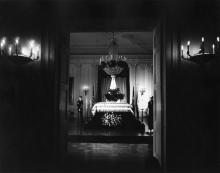
On this date 50 years ago, President John F. Kennedy was assasinated while in Dallas on a campaign tour. As the nation remembers this event, we reflect on President Kennedy's life and death.
Walter Cronkite, visibly emotional, announced the president's death on a CBS News bulletin.
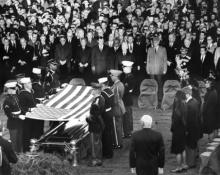
Facing crowded pews and heavy hearts, Dallas clergy took to the pulpits on Nov. 24, 1963 to try to make sense of the assassination of President John F. Kennedy just two days before.
“The ministers saw the assassination as an unwelcome opportunity for some serious, city-wide soul-searching,” said Tom Stone, an English professor at Southern Methodist University, who has studied the sermons delivered that day.
“Though Dallas could not be reasonably blamed for the killing, it needed to face up to its tolerance of extremism and its narrow, self-centered values,” Stone said.
As they finished their messages, some, including the Rev. William H. Dickinson of Highland Park Methodist Church and the Rev. William A. Holmes of Northaven Methodist Church, were handed notes: assassin Lee Harvey Oswald had just been gunned down by Jack Ruby.

NOVEMBER MARKS the 50th anniversary of the assassination of our 35th president, an event that defined the life of the baby-boomers—a generation that, by sheer force of numbers, still sucks up most of the oxygen in U.S. culture. There are new books, reissued books, documentaries, made-for-TV movies, and a new Hollywood production, Parkland, starring that Everyman of the baby boom, Tom Hanks. But, anniversary hoopla aside, the JFK assassination and its aftermath can also provide us with some very timely lessons about the dangers that come with secret wars and unaccountable power.
Fifty-nine percent of Americans don’t believe the official story that Lee Harvey Oswald alone killed President John F. Kennedy, and this time the majority is right. The available evidence strongly suggests that the president was the victim of a murder plot that involved anti-Castro Cubans, enraged by his failure to back them up during the Bay of Pigs invasion, and their allies in organized crime who had been heavily invested in pre-Castro Havana. That was the conclusion of the House Select Committee on Assassinations in 1978, which also found physical evidence of another shooter at the crime scene.
Of course, the armed anti-Castro forces in Florida were a bought-and-paid-for creation of our CIA, and the CIA was also working with organized crime figures in various plots to assassinate Castro. So it’s no great leap to suspect some complicity in Kennedy’s assassination by CIA employees. Some reasonable people, including peace activist and theologian James W. Douglass in his book JFK and the Unspeakable, have gone further, claiming that the Kennedy assassination was the result of a policy decision, taken at the very highest levels of the national security state, aimed at heading off JFK’s plans to pull out of Vietnam and end the Cold War. This theory relies heavily on National Security Action Memorandum 263, which laid out plans to begin withdrawing troops from Vietnam, and journalist Norman Cousins’ account of back channel diplomacy in the book, The Improbable Triumvirate: John F. Kennedy, Pope John, Nikita Khrushchev.
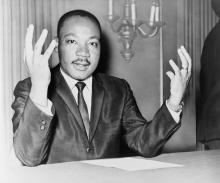
This August will mark the 50th anniversary of Martin Luther King’s “I Have a Dream” speech, and there will rightly be much remembrance and celebration of its place in American history. But there is another anniversary that our nation, and especially its Christians, would do well to acknowledge, investigate, and ruminate.
Forty-five years ago yesterday, Dr. King arrived in Memphis, Tenn., to support a sanitation workers’ strike seeking to unionize. He was assassinated the next day — the anniversary we today remember — and in a sad irony our nation began the sanitation of his legacy. Indeed, King’s decision to join the Memphis struggle was just one of many acts that clash with what David Sirota calls the “Santa Clausified” image of King that we pass to our youth.
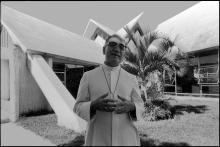
Editor's Note: The following is a poem written by Trevor Scott Barton following reading The Violence of Love by Archbiship Oscar Romero, who was assassinated in El Salvador in 1980.
Children
longing for a hero,
living love, peace and hope,
protecting ordinary people from extraordinary hatred and violence,
peaceful hero,
dying for the cause but not killing for it,
denying guns and bombs their power,
risking the violence of love.
Conserving tradition at first for the greatest,
seeing through your glasses at last for the least,
feeling the hunger of underpaid workers,
knowing the poverty of farmers,
hearing the warning, "Here's what happens to priests who get involved in politics,”
holding tears of the disappeared.
Challenging,
calling all to view the liberating body of a slain priest,
serving the poor,
using words to build up humanity and tear down injustice,
"In the name of God, stop killing ..."
offering crucifixion,
discovering resurrection.
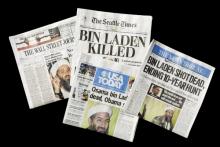
A year ago today, I read a Tweet that President Barack Obama was interrupting primetime TV to address the nation regarding terrorism. My heart dropped. All I could think about was that terrifying feeling 10 years earlier while watching 9-11 coverage. It only took about half an hour of speculation on 24-hour news stations, Twitter, Facebook, etc., before reports came out that Obama would be announcing the death of public enemy No. 1, Osama bin Laden.
My first reaction was relief. The second, I confess, was one of pride—shared by the nation at the time and many still. But at some point in the aftermath, I read a friend’s post that convicted me and brought me back to reality.
Forty-five years ago today, the Rev. Dr. Martin Luther King delivered his now-famous speech at Riverside Church in New York City, declaring his opposition to the war in Vietnam. One year later -- 44 years ago today -- he was murdered by an assassin.
It is fitting that these anniversaries occur this year during the week we commemorate the death and celebrate the resurrection of Jesus.
Dr. King’s Riverside speech is frequently quoted, with his scathing political indictment of the war and the systems of exploitation and oppression that led to it. But how often do we remember that he began that speech by noting that while the Nobel Peace Prize was “a commission to work harder than I had ever worked before,” it was not the most important thing. He continued by saying that:
This is a calling that takes me beyond national allegiances, but even if it were not present I would yet have to live with the meaning of my commitment to the ministry of Jesus Christ. To me the relationship of this ministry to the making of peace is so obvious that I sometimes marvel at those who ask me why I'm speaking against the war. Could it be that they do not know that the good news was meant for all … Have they forgotten that my ministry is in obedience to the One who loved his enemies so fully that he died for them?
Dr. King was able to be the leader he was, take the risks he did, and ultimately make the final sacrifice, because he knew who called him and who he followed. He knew that the sacrificial death and resurrection of Jesus was a living presence in his life and gave him the hope to follow.
For him, as well as us, believing in Jesus means being a follower and a disciple in bringing the kingdom he lived and taught. By raising Jesus, by vindicating his life and death, God vindicated his message – the kingdom he proclaimed has come and will come. And because God raised Jesus from death, his living presence continues among us and we are empowered to follow him and to live the kingdom. The resurrection is the event on which our faith and hope depends.
That faith sustained Dr. King, and it can sustain us.
Two long pieces this weekend described "one hell of a killing machine," and "the dark matter